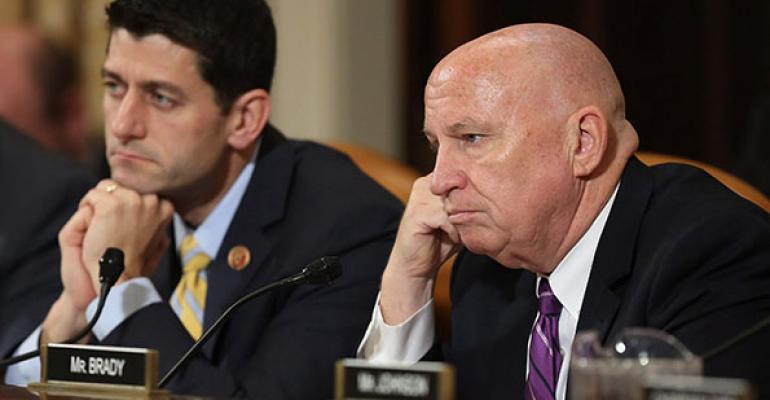March 3, 2015 marked a significant day in the fight for estate tax repeal: Reps. Kevin Brady (R-TX) and Sanford Bishop (D-GA) announced the introduction of HR 1105, the Death Tax Repeal Act of 2015. While similar pieces of legislation have been introduced in previous years, this year’s bill will likely proceed to the House floor for a vote – the first in a decade.
Though the text of the bill isn’t yet available, it’s expected to be similar to previous versions that would have amended the Internal Revenue Code to: (1) repeal the estate and generation-skipping transfer taxes, and (2) make permanent the maximum 35 percent gift tax rate and a $5 million lifetime gift tax exemption. Those bills also would have provided for an inflation adjustment to such exemption amount.
In introducing the bill, Brady, a senior member of the tax-writing Ways & Means Committee, said: “The Death Tax is still the number one reason family-owned farms and businesses in America aren't passed down to the next generation. It's the wrong tax at the wrong time and hurts the wrong people. After a family loses a loved one, why should Uncle Sam swoop in and take much of the nest egg they spent a lifetime building? Especially when it forces the survivors to sell their land or business just to try to keep what they worked so hard to earn.”
Brady echoes the sentiments of many Americans. The repeal of the estate tax has remained popular over the years, largely because it’s a punitive tax on the very backbone of the American economy – family-owned businesses and farms. It puts these companies at a competitive disadvantage to their corporate competition. Further, the estate tax brings in less than 1 percent of the government’s revenue. HR 1105 signifies that Congress recognizes the attitude of the American public and the need for repeal
The bipartisan introduction of this legislation in early March preceded several key repeal events: a subcommittee hearing, Senate introduction of the bill and a House floor vote.
Subcommittee Hearing
On March 18, the Ways and Means Subcommittee on Select Revenue Measures held a hearing to examine the burden the estate tax places on family businesses and farms. This was the first hearing on the subject of repeal since the 1990s – a move that will signify to Congressional leadership and the Administration the importance of estate tax repeal.
The hearing on HR 1105 provided an opportunity for leaders in the repeal movement to gauge where Congressional members and parties stand on the issue. In a key moment during the hearing, Subcommittee Chairman Dave Reichert (R-WA), as well as Ranking Member Richie Neal (D-MA), both recognized that the estate tax is quite harmful to many businesses. This bipartisan recognition of the tax’s harmful effects is certainly a good starting point, but as the hearing progressed, some Democratic members indicated their opposition toward full repeal.
Rep. Neal and fellow Democratic subcommittee members Linda Sanchez (D-CA) and Mike Thompson (D-CA) expressed strong opposition to repeal the tax, opting instead to support “carving out” farm land as exempt from the tax. Rep. Thompson said he would soon be introducing a bill that would amend the tax code to provide this exemption. As we learned in the 1990s with the Qualified Family Owned Business Interest (QFOBI), which instituted a similar provision, these carve-outs are difficult to administer. Taxpayers and the IRS struggled to define what constituted a family business and who qualified as a family member. For this reason, QFOBI was repealed soon after its enactment.
On the other hand, Republican members of the subcommittee expressed strong support for repeal, recognizing that planning for and paying the tax diverted precious resources away from job creation into the hands of lawyers, accountants and life insurers.
Potential Future Action
This rare estate tax hearing comes ahead of potential action at the full Ways and Means Committee level, as Chairman Paul Ryan (R-WI) intends to hold a vote on the bill in committee.
Sen. John Thune (R-SD) will most likely reintroduce his companion legislation in the Senate in the weeks following the House Subcommittee hearing. There will be a press event announcing the Brady and Thune bill that’s in the works for late March. A similar press event occurred when the previous bills were introduced in 2013 and included remarks by fellow legislators and allies of the cause.
All this fanfare is intended to lead up to an April House floor vote on HR 1105. This would be the first House vote on stand-alone repeal legislation since 2005 and a major milestone in returning the issue of estate tax repeal back to the front of the tax policy debate.
Crucial Turning Point
HR 1105 and its related events come at a critical turning point for the estate tax. The United States currently has the sixth highest estate tax rate in the world, and a new proposal by President Obama could increase the U.S. estate tax rate to the highest. The Administration is proposing a “double death tax” – besides the current estate tax, the taxation of capital income would be reformed, including the increase of capital gains and qualifying dividend rate to 28 percent and gifts and transfers at death as a sale of property. Furthermore, the President’s Fiscal Year 2016 budget omitted, for the third straight year, any mention of eliminating valuation discounts. This omission leads many to suspect the Internal Revenue Service intends to eliminate or curtail this legitimate planning method through regulation.
Given these developments, the introduction of HR 1105 is incredibly timely. It will send a message to the Administration that repealing the estate tax has the support of both lawmakers and the American public.
Patricia Soldano is founder of the Policy and Taxation Group, based in Washington D.C.






